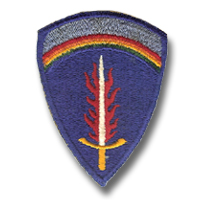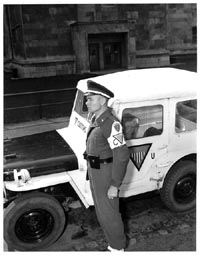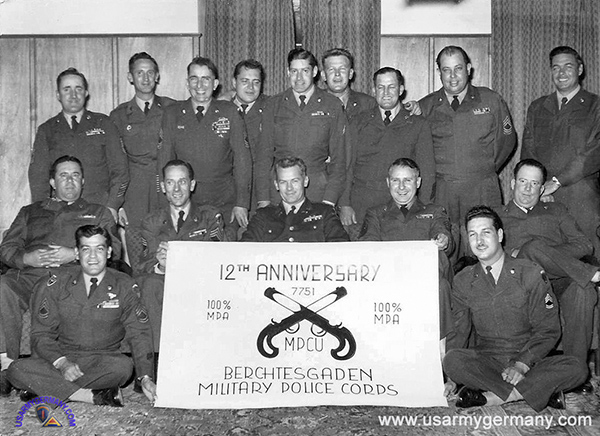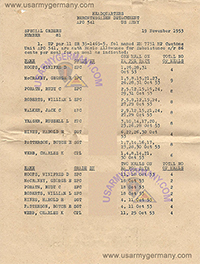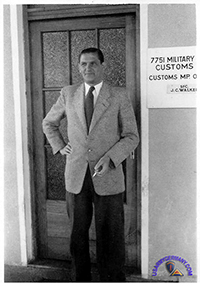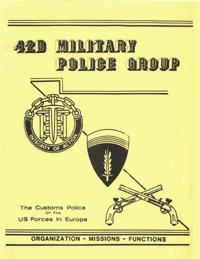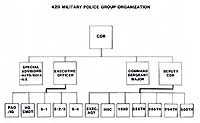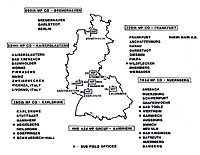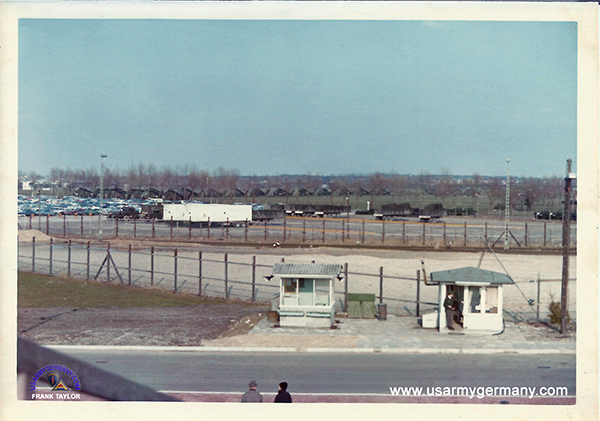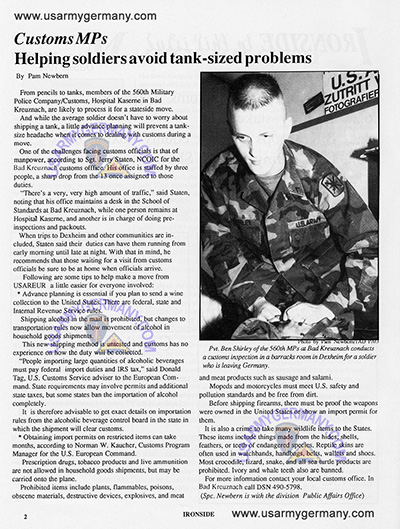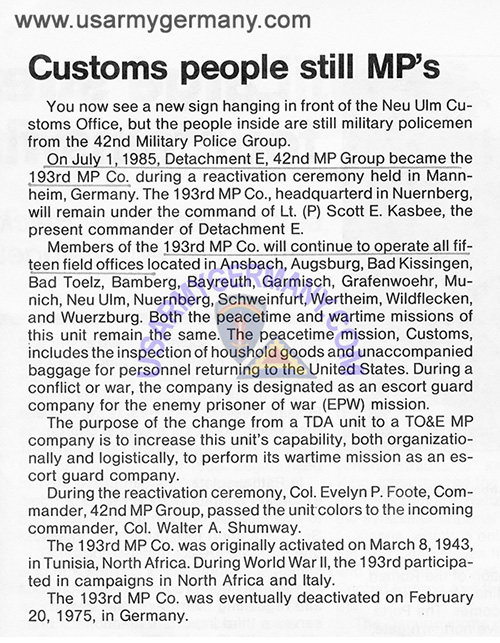| If you do
NOT see the Table of Contents frame to the left of this page, then
Click here to open 'USArmyGermany' frameset |
||||||||||||||||||||||||||||||||||||||||||||
|
42nd
Military Police Group (Customs) |
||||||||||||||||||||||||||||||||||||||||||||
|
|
||||||||||||||||||||||||||||||||||||||||||||
|
||||||||||||||||||||||||||||||||||||||||||||
|
|
||||||||||||||||||||||||||||||||||||||||||||
| 7751st MP Customs Unit History | ||||||||||||||||||||||||||||||||||||||||||||
| 1949 - 1968 | ||||||||||||||||||||||||||||||||||||||||||||
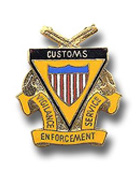 7751 MP Customs
Unit DUI
7751 MP Customs
Unit DUI |
||||||||||||||||||||||||||||||||||||||||||||
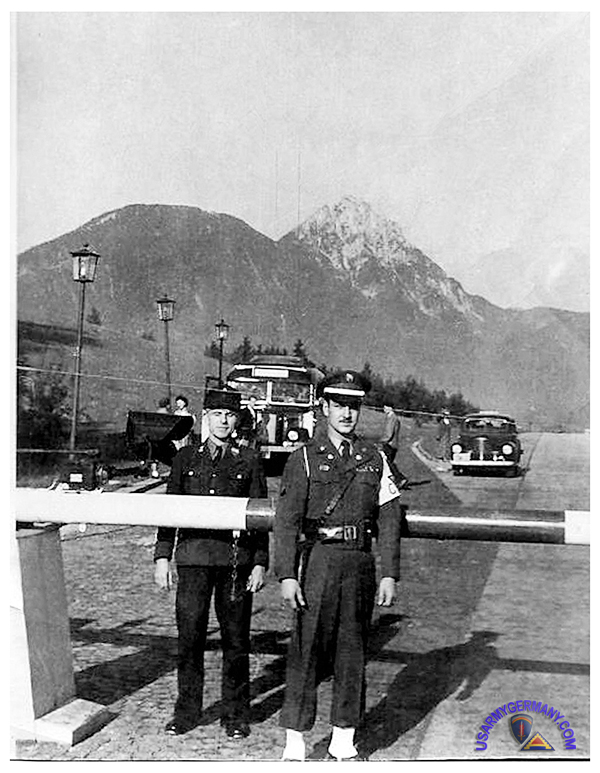 Berchtesgaden Detachment - border control point (Jack Walker) |
||||||||||||||||||||||||||||||||||||||||||||
| 1949 | ||||||||||||||||||||||||||||||||||||||||||||
(Source: Email from Jackie Carlson, daughter of Jack C. Walker) |
||||||||||||||||||||||||||||||||||||||||||||
My father, Jack C. Walker, was initially with in the US Constabulary and later in the MP Customs unit 7751 from 1947 to 1954 I believe. He served in the APO 541 Berchtesgaden Detachment according to these orders and things I have. I have recently opened some of my father's old footlocker/trunks. They are filled with all most every document he ever touched. |
||||||||||||||||||||||||||||||||||||||||||||
| 1952 | ||||||||||||||||||||||||||||||||||||||||||||
(Source:
Army Information Digest, September 1952) |
||||||||||||||||||||||||||||||||||||||||||||
Front
Lines in the Cold War By Captain Edgar M. Jones |
||||||||||||||||||||||||||||||||||||||||||||
If the Cold
War can be said to have any visible front lines, then a small
group of American Military Police may be said to be manning that
line. It is a line devoid of spectacular action, although the
possibility of physical danger and violence is always imminent.
And while there is no glory and no widespread recognition for
these men of the 7751st Military Police Customs
Unit, their organization is wielding an influence and
responsibility all out of proportion to its numbers in helping
to advance the cause of Western nations -- and especially the
cause of the United States. |
||||||||||||||||||||||||||||||||||||||||||||
|
|
||||||||||||||||||||||||||||||||||||||||||||
| 42nd MP Group History | ||||||||||||||||||||||||||||||||||||||||||||
| 1968 - 1994 | ||||||||||||||||||||||||||||||||||||||||||||
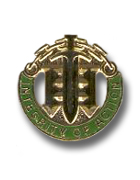 42nd MP Group
DUI
42nd MP Group
DUI |
||||||||||||||||||||||||||||||||||||||||||||
|
HISTORY OF THE 42D MILITARY POLICE GROUP
The precursor organization of the 42d MP Group, i.e., the 7751st MP Detachment, was established on 21 March 1949, to fight organized and widespread blackmarket activities which posed a serious threat to the German economy. The unit enforced USEUCOM Customs Regulations, investigated violations thereof, controlled parcel post shipments of blackmarketable goods, and manned twenty-three border stations used by US military personnel crossing the international borders of (then) US occupied Germany. In August 1950, the US High Commission for Germany requested the services of the "Customs Unit," later designated as the 42d Military Police Detachment, to control the eastward movement of restricted goods to "Satellite Bloc" countries. On 1 November 1952, the "Customs Unit" was relieved of its strategic export control function and this function was resumed by German authorities. In May 1955, Germany regained sovereignty. The rights, privileges, and obligations of the foreign forces and their members stationed in Germany were then based on the "Bonn Forces Convention," the forerunner of the NATO Status of Forces Agreement (NATO SOFA) and the Supplementary Agreement thereto. As a result, the "Customs Unit" was charged with establishing customs controls within Germany. |
||||||||||||||||||||||||||||||||||||||||||||
|
||||||||||||||||||||||||||||||||||||||||||||
| If you have more
information on the history or organization of the 42nd MP Gp, please
contact me |
||||||||||||||||||||||||||||||||||||||||||||
|
|
||||||||||||||||||||||||||||||||||||||||||||
1969 |
||||||||||||||||||||||||||||||||||||||||||||
(Source:
Email from Richard Fletcher) |
||||||||||||||||||||||||||||||||||||||||||||
I was with (Detachment B,) 42nd MP Grp Customs, Bremerhaven, Germany from May 1969 to May 1970. Major David Lynch was our CO and Post Provost Marshall. I never heard the name Carl Schurz Kaserne before - that is new to me. (Webmaster note: at that time, the installation was still known as the "US Army Staging Area, Bremerhaven.") The 42nd MP Grp Customs, Bremerhaven, was responsible for the Free Port Christopher Columbus Quay. We had regular patrols, plus gate duties with the German Zoll (Customs), (Army) Post Office inspecting packages, car shipping center, and field investigators (3). We also inspected all MSTS ships that came into the freeport. Overall our responsibilities included the Status of Forces Agreement related mainly to things that would impact the German economy; cigarettes, gasoline. etc. We still had the SS United States thru either October or November of 1969, we would custom clear all military personnel traveling on the ship when it arrived. It seems we covered a wide geographic area - Bremen, we had a one main office in a confiscated house; Helmstedt, we had a post on the border. I went to Putgarden, Germnay over July 4, 1969, and worked with German Zoll. From there we went by ship over to Denmark and met with Danish police about some custom issue. During the summer of 1969, we travelled monthly to Heidelberg, for meetings with DEA, US Customs and various agencies for a planned three month tour to Vietnam to bring out Big Red One. That was nixed as Nixon didn't want additional troops added to Vietnam troop totals so they sent regular US custom people. Our CO, Major Lynch, was also the Provost Marshall of the Post. He was a great officer and we constantly interacted with German Zoll, via parties on their boats and other functions. In the fall or winter of 1969 we liaised with a British Group of MP's in Hamburg and helped them rotate back to England thru Bremerhaven. They had been in the field about 3 years. I have stayed in touch with a few of my comrades, unfortunately the last one passed away about 6 years ago. Would appreciate any contacts you might have. Feel free to email me. I use to have a lot of pictures and stuff don't have now. Hope this helps. |
||||||||||||||||||||||||||||||||||||||||||||
| ADDITIONAL INFORMATION The base was located right next to the Free Port via the back gate. The Staging Area was also a Navy facility - they had a Navy listening post. The Army provided support, security, fire, post office, mess etc. and I guess all the TOE. The listening post was surrounded by a 12-foot fence with concertina wire and their staff never interacted with any of us. I think they had all there own facilities inside the secured area. Very little discussion about that area. There were other Navy personnel stationed there, many who had been out to sea and were awaiting further orders to go back to sea. We would see the Navy guys in the NCO club and interact with them there, never anywhere else. Bldg 3 included the Provost Marshal Office and the MP Office. The 42nd MP Customs Office was in Bldg 11 which also included the MI Office, Tailor Shop and Dry Cleaning. Bldg 6 were the billets for the Post MPs and the 42nd MP Cusomts folks. Bldg 102 served as the mess hall. There were two back gates. -- The one near the AFN Building was always closed. We never used it. -- The other gate was at the southern end of Massachusetts Ave. Go thru the gate and make a left towards Columbus Quay about 20 yards, there would be the Zoll gates or guard houses. Germans manned theirs 24/7. We didn't staff ours all the time. |
||||||||||||||||||||||||||||||||||||||||||||
1974 |
||||||||||||||||||||||||||||||||||||||||||||
(Source:
Email from James "Jim" O'Fallon) |
||||||||||||||||||||||||||||||||||||||||||||
I am a retired MP E8. I spent 6 years as the NCOIC of the Hanau Field Office with the 42d from 1974 to 1980. I spent a total of 12+ years in Germany out of my 22+ years in the Army. I spent 2 tours in Kassel with the 709th, later the 510th and later the 61st. In fact I assisted in closing the MP Station in Kassel in early 1972 (we had moved from the HICOG bldg on Wilhelmshohe Allee to co-locate at the G/P station in Ihringshausen. I spent the remainder of 1972 until I rotated commuting to Fulda and working PS at the MP Station. Kassel was "northern Garmisch" and I had a great time. But the most fun I had in the Army was the 6 years I spent with the 42d in Hanau. My lSG was Andy Wilbanks at Det C in Frankfurt and good old Maj John Bock was my Det Cdr. I went thru some really hardcore Group Cdrs, Col Hooker, Col Friedman. I also had Col Gregerson, Col Peters and right at the end Col McDaniels. I deployed on 7 Reforgers in 6 years (2 in one year), and at least a dozen "Able Archer and Wintex" FTXs in northern Germany. These were Corps Hqs FTX's out of Ft Hood interacting with the Brits in the Paderborn, Sennerlager Trng area and Gutersloh RAF Base. My main recollection of these exercises was the point/advance party leader Col Charley Brown, Hqs Comdt at Ft Hood. He used to carry an axe handle (given to him by the Brits) to maintain "dignity in the cantonment area" as he put it. We processed 10% of the troops as they entered Germany at Gutersloh and processed 100% as they left 2 weeks later. I recall one of the FTXs had 7 GO's, one from each of the combat divisions stateside. During the 2 weeks we were on our own and had a great time sightseeing. After being stationed In Kassel I was very familiar with northern Germany as our AOR took in everything but Bremerhaven and Checkpoint Alpha at Helmstedt. ADDITIONAL INFORMATION As mentioned earlier, I was stationed in Kassel, Germany, as an MP for 2 tours. A CID agent named Kenneth Sparks (Sparky) was stationed in Kassel. Sparky related that as a young Cpl during WWII he was assigned to the Constabulary. He was there when they converted to the MP, etc. He is retired and living in Hawaii. I have not had contact with him in a few years, he could have passed away. He was a huge collector of badges/crests and it seemed to me he knew half the military folks all over the world? There was an interpeter at the MP Station named Rie Coenen. She worked for the Germans as a translator at Henschels and after the war went to work for the Constabulary as an interpreter. |
||||||||||||||||||||||||||||||||||||||||||||
|
1982
|
||||||||||||||||||||||||||||||||||||||||||||
|
(Source:
Email from Rick D. Moderie, 42nd MP Gp, 1982-85; 1987-93)
|
||||||||||||||||||||||||||||||||||||||||||||
|
I
was stationed in Germany during the timeframe 1982 to 1993, almost
continuously assigned to 42d MP Group.
I was a customs investigator in Nuernberg from 1982 to 1985 and in Hanau and Frankfurt from 1987 to 1993. I have lots of experiences to relate concerning USAREUR during the "Cold War." |
||||||||||||||||||||||||||||||||||||||||||||
|
The
42nd MP Group was organized in 1968 from the 7751st MP Detachment.
Mission: This was the unit layout in July 1980: |
||||||||||||||||||||||||||||||||||||||||||||
|
||||||||||||||||||||||||||||||||||||||||||||
|
In
June 1985, the companies converted to TO&E units. Evelyn P. "Pat"
Foote, then a Colonel, was group commander.
EPW Guard Companies: 294th MP Co, formerly Det D 560th MP Co, formerly Det B EPW Escort/Guard Companies (TO&E 19-256): 193d MP Co, formerly Det E 256th MP Co, formerly Det C 285th MP Co, formerly Det A While being designated as TO&E units, they still maintained a TDA unit. Investigators were assigned the TDA positions. I was in Frankfurt Field Office. Our Field Office NCOIC was the "squad leader." A TO&E platoon sergeant, responsible for personnel, leadership and training (not the TDA missions) was responsible for Wiesbaden, Frankfurt and Rhein-Main "squads." Lots of conflicts arose from this strange setup (which looked good on paper, albeit severely hampered the effectiveness of investigations and customer service capabilities). |
||||||||||||||||||||||||||||||||||||||||||||
| 1989 | ||||||||||||||||||||||||||||||||||||||||||||
(Source:
Military Police, November 1989) |
||||||||||||||||||||||||||||||||||||||||||||
40
Years of Challenge By Robert Szostek |
||||||||||||||||||||||||||||||||||||||||||||
| Born forty years
ago in the ruins of postwar Germany, the 42d Military Police Group
is tasked with a mission that spans the European continent. Immediately after World War II the 42d began its fight against widespread black market activity. Even after Germany regained sovereignty black market investigations continued to protect the reemergent Germany economy. During these critical years the group manned major German border crossings, the Bremerhaven seaport, and international airports to control the flow of tax- and duty-free goods into and out of Germany, as well as assist soldiers during border crossings. Although the group relinquished these border posts in 1980, its military police stayed on at Frankfurt International Airport and Rhein Main Air Base (where most military members and their families still enter Europe). The 42d's primary mission remains law enforcement under the NATO Status of Forces Agreement, particularly regarding drug and black market suppression. However, helping new arrivals to import pets and other restricted items is also important. In 1968 the 42d MP Group also assumed the military customs inspection (MCI) mission for USAREUR (United States Army, Europe). Qualified customs inspectors inspect everything from household goods to tanks moved through military channels m the United States. Each year 42d's inspectors clear approximately one hundred thousand household goods shipments, twenty thousand privately-owned vehicles (POVs), five thousand military aircraft and eighty thousand passengers. This saves the government and the individual soldier, DOD civilian, and their families time and money. Because shipments, passengers, and vehicles cleared by the 42d are not normally inspected when they enter the United States, they reach their destination sooner. The U.S. Department of Agriculture requirements are of central importance to the MCI mission. They safeguard the American farming industry from foreign pests such as the Mediterranean fruit fly. It tray be unusual to see an MP crawling tinder a wet tank looking for dirt; but that dirt could harbor nematodes and other voracious insects that could wipe out the American potato industry if they reached CONUS. When considered in that context, the mission is an awesome responsibility for young soldiers. Customs information is also a vital service that can save a soldier from unintentionally breaking the law. So 42d's public affairs office uses all available media to tell the U.S. forces audience in Europe about customs and agriculture laws and about their host nation tax- and duty-free benefits. This mission is challenging because many soldiers and their families have never dealt with customs before. As a result of the group's expertise in the military customs inspection arena, it was assigned duties as the executive agent for all customs matters in the European Command. The Group USEUCOM (United Stated European Command) Executive Agency for Customs supervises approximately 180 MCI programs run by the Army, Navy, and Air Force in nine European countries. Advisors from the U.S. Customs Service and U.S. Department of Agriculture assist in program accreditation, coordination with U.S.federal agencies, and training. Training Is Unique The core of this training is a unique week-long qualification course organized and conducted by the executive agency. It introduces MPs to the complex world of customs and agriculture regulations. Which U.S. Department of Transportation safety rules apply to POVs built in 1971? What paperwork does the Bureau of Alcohol, Tobacco and Firearms need for a 9mm handgun made in Lithuania after 1945? Other subjects covered in the training range from currency, wildlife, and environmental protection laws to Public Health Service regulations. Military police are taught to inspect household goods, POVs, aircraft, passengers and cargo. They learn the latest smuggling methods and are given reinforcement training in drug recognition. Later in the week the MPs learn the tax and customs laws that apply to the U.S. forces in Germany under the NATO Status of Forces Agreement. Who exactly is allowed to have tax-free privileges in Germany? What privileges do they have and what are the limitations? In addition, classes are given on black-market investigations and surveillance. A military working dog team comes to demonstrate the effectiveness of its drug-detection capabilities. The interaction between the group's military customs inspectors, dog handlers, and investigators is heavily stressed. One spin-off from the MCI mission is the 42d's role in the annual REFORGER exercise. When REFORGER troops land in Europe, the 42d's customs inspectors are there to speed them through customs. Then, when the exercise is over, the troops and their baggage move to special customs clearance areas where they are inspected before flying back home. Their equipment goes to wash sites where it is cleaned by the unit, inspected by the 42d, and then loaded onto flatcars for the journey to the port and the voyage to CONUS. All this saves the taxpayer millions of dollars each year because such precleared flights don't have to land at U.S. ports of entry, download, and go through customs before flying on to their destinations -- thereby saving time, fuel, airport landing fees, and customs user fees. To give the MCI program real teeth, the 42d was the first Army unit in Europe to acquire drug-detector dog teams. Today the 42d still has the largest drug-detector dog force in USAREUR for its own customs operations and to support USAREUR drug-suppression missions, with seventeen kennels strategically placed throughout Germany and Italy. Today the majority of 42d's dogs not only detect drugs, they also perform patrol functions for wartime. This bewildering array of peacetime customs-related tasks would seem enough to keep any unit busy, but the 42d also performs extensive combat planning and training. In wartime the headquarters of the 42d assumes command and control of MP assets in the RCZ. The (peacetime) subordinate companies become enemy-prisoner-of-war (EPW) guard and escort guard units collecting EPW from forward units and escorting them to camps set up by the guard companies. Here tile prisoners are processed for shipment out to permanent EPW camps. To meet its missions the 42d is dispersed over a wide geographic area with forty-three field offices ranging from Bremerhaven in the far north of Germany, to West Berlin, and to Livorno, Italy, in the south. The five subordinate companies fall under the group headquarters in Mannheim, Germany: their headquarters are located in Fuerth (1934 MP Company), Frankfurt (256th MP Company), Karlsruhe (285th MP Company), Kaiserslautern (294th MP Company), and Bremerhaven (560th MP Company). NCOs Play Key Role Communication and individual responsibility are the vital keys to the success of this widely dispersed organization. Soldiers on the ground must make good independent decisions; their company headquarters is sometimes hundreds of miles away. For this reason NCOs in the 42d are assigned more responsibility than NCOs in many other MP units. A noncommissioned officer is appointed as the NCOIC of a field office supplying many customs services to whole military communities serving thousands of soldiers, civilians, and families. These NCOs must also independently apply the local laws pertinent to their particular area. Laws that apply in Frankfurt may not always apply in Berlin, and may be different again from Italy. The local field office serves as a focal point of law enforcement liaison between the German customs authorities, provost marshal, and CID (Criminal Investigation Division). Exercise missions require the NCOs to organize travel to foreign countries from Norway to Zaire, provide troop support for their soldiers while abroad, and complete the customs mission with minimum delay. Such unique challenges are the reasons why so many soldiers choose to stay in the 42d. Although the demands placed upon the 42d have changed during its forty-year history, its basic missions have remained the same: provide peacetime customs support to members of the U.S. forces and to be prepared to fight, survive, and win in war. In this the 42d has succeeded. Throughout the last forty years the road has been paved with challenges for the 42d Military Police Group and it has met them all. In the future continued emphasis must be placed upon balancing the sensitive nature of peacetime support with the critical training for wartime support. The 42d Group has accepted this challenge. |
||||||||||||||||||||||||||||||||||||||||||||
1994 |
||||||||||||||||||||||||||||||||||||||||||||
In August 1994, the 42d MP Group (Customs) was inactivated as part of the drawdown of US military forces in Europe. |
||||||||||||||||||||||||||||||||||||||||||||
| Detachment "B" / 560th Military Police Company (Customs) | ||||||||||||||||||||||||||||||||||||||||||||
| 1993 | ||||||||||||||||||||||||||||||||||||||||||||
(Source:
IRONSIDE, October 1993) |
||||||||||||||||||||||||||||||||||||||||||||
Military Police customs agents from the 560th MP Customs Company process soldiers returning to the US as part of the drawdown. |
||||||||||||||||||||||||||||||||||||||||||||
|
|
||||||||||||||||||||||||||||||||||||||||||||
| Detachment "E" / 193rd Military Police Company (Customs) | ||||||||||||||||||||||||||||||||||||||||||||
| 1985 | ||||||||||||||||||||||||||||||||||||||||||||
| (Source: DONAU (Neu Ulm Military Community newspaper), July 26 1985) | ||||||||||||||||||||||||||||||||||||||||||||
| On July 1, 1985 Detachment "E" of the 42nd MP Group was redesignated as the 193rd Military Police Company (Customs). Hqs of the new unit remains in Nürnberg. |
||||||||||||||||||||||||||||||||||||||||||||
| Related Links: | ||||||||||||||||||||||||||||||||||||||||||||
